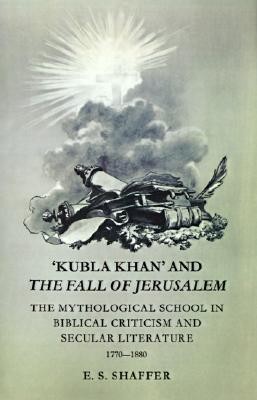| 'Kubla Khan' and the Fall of Jerusalem: The Mythological School in Biblical Criticism and Secular Literature 1770-1880 Contributor(s): Shaffer, E. S. (Author) |
|
 |
ISBN: 0521298075 ISBN-13: 9780521298070 Publisher: Cambridge University Press OUR PRICE: $54.14 Product Type: Paperback - Other Formats Published: June 1980 Annotation: Dr. Shaffer outlines the development of the 'mythological school' of European Biblical criticism, especially its German origins and its reception in England, and studies the influences of this movement in the work of specific writers: Coleridge, Holderlin, Browning, and George Eliot. The 'higher criticism' treated sacred scripture as literature and as history, the product of its time, and the highest expression of a developing group consciousness; it challenged current views on the authorship and dating of the Pentateuch and the Gospels, on inspiration, prophecy, and canonicity, and formulated a new apologetics closely linked with the growth of romantic aesthetics. The importance of this study is that it shows that readings of specific literary texts can intersect with general movements of thought and action through the scrutiny of a clearly defined intellectual discipline, here the higher criticism, which developed as a particular expression of the larger trends in the history of the period. Dr Shaffer throws light on individual works of literature, the formation of movements, the origin of new genres, literary relationships between England and Germany, and the bases of European romanticism. |
| Additional Information |
| BISAC Categories: - Literary Criticism | Semiotics & Theory - Social Science | Folklore & Mythology - Religion | Biblical Criticism & Interpretation - General |
| Dewey: 809.1 |
| LCCN: 74079141 |
| Physical Information: 0.96" H x 6.02" W x 9.04" (1.32 lbs) 372 pages |
| Themes: - Cultural Region - British Isles |
| Descriptions, Reviews, Etc. |
| Publisher Description: Dr. Shaffer outlines the development of the 'mythological school' of European Biblical criticism, especially its German origins and its reception in England, and studies the influences of this movement in the work of specific writers: Coleridge, Holderlin, Browning, and George Eliot. The 'higher criticism' treated sacred scripture as literature and as history, the product of its time, and the highest expression of a developing group consciousness; it challenged current views on the authorship and dating of the Pentateuch and the Gospels, on inspiration, prophecy, and canonicity, and formulated a new apologetics closely linked with the growth of romantic aesthetics. The importance of this study is that it shows that readings of specific literary texts can intersect with general movements of thought and action through the scrutiny of a clearly defined intellectual discipline, here the higher criticism, which developed as a particular expression of the larger trends in the history of the period. Dr Shaffer throws light on individual works of literature, the formation of movements, the origin of new genres, literary relationships between England and Germany, and the bases of European romanticism. |